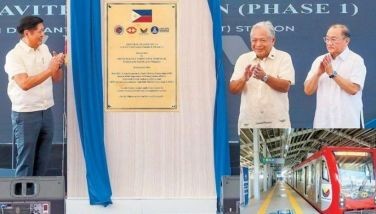Bill seeks political Cha-cha
MANILA, Philippines - Advocates of Charter change in the House of Representatives may have to talk politics after all, as two senior lawmakers yesterday filed a bill seeking amendments not only to the economic provisions of the Constitution but to political provisions as well.
In their proposed bill, Cagayan de Oro City Rep. Rufus Rodriguez and his brother Maximo, who represents the party-list group Abante Mindanao, are asking Congress to convene a constitutional convention (con-con) to propose constitutional amendments.
The Rodriguez brothers’ proposal came days after Quezon City Rep. Feliciano Belmonte Jr., the speaker in the previous Congress, filed a resolution seeking changes solely in the economic provisions of the Constitution through the legislative route with a national plebiscite.
Belmonte is expected to be reelected Speaker in the current Congress.
Among the political changes being proposed by the Rodriguez brothers were shifting the country’s form of government from presidential system to federal-parliamentary, conversion of Congress into a one-chamber parliament, and the abolition of the term limits for senators, congressmen and other local officials.
“Now is the perfect time to push for a constitutional convention given that businessmen and the people have full trust and confidence in President Aquino,†Rodriguez said.
“The people can see the President as someone who will pursue Charter change without any political agenda.â€
The Rodriguez brothers noted that Charter amendments in the past were proposed by a nationally elected convention.
He called con-con the “most democratic and transparent†way of amending the Constitution.
Belmonte wants Charter change done by the Senate and the House jointly assembled as a constituent assembly but voting separately.
A con-ass mode is considered faster and less expensive and is ideal in cases where amendments are limited to specific provisions, since one chamber would have veto power over the other, according to Belmonte.
In their con-con bill, the Rodriguez brothers proposed that foreign ownership restrictions in the exploration and use of natural resources, in public utilities, educational institutions, mass media, advertising, and other investment areas be lifted.
They also want land ownership to remain in the hands of Filipinos only until land distribution under the comprehensive agrarian reform program is completed.
Rep. Rufus Rodriguez, president of the Centrist Democratic Party, said the country’s high unemployment rate “is a clear and compelling reason to ease the economic restrictions in the Constitution, especially now that we have good growth, low inflation and good credit ratings.â€
Despite the favorable investment environment, “we have one of the lowest, if not the lowest, foreign direct investments in Southeast Asia,†he said.
“We could be overtaken by Cambodia and Myanmar if we do not act and remain paralyzed by unfounded fears on amending the Constitution. We need an investment revolution if we want true and inclusive growth,†he said.
Aside from changes in the structure of government, the two Mindanao lawmakers want members of parliament to be elected to a four-year term, instead of the present three years for congressmen and local officials and six years for senators, without limit to their reelection.
They are also proposing the restoration of majority and minority party representation in the board of election inspectors, which would continue to be chaired by a public school teacher.
They also want the appointment of justices to the Judicial and Bar Council confirmed by the Commission on Appointments.
In seeking political changes, the Rodriguez brothers said the current setup has not brought about progress for the country and an improvement in the lives of the people.
Under their con-con bill, the convention would be composed of one delegate each from the country’s 234 legislative districts, with the same qualifications as House members.
They would be entitled to a P2,500 allowance per day of attendance in the session of the convention or in the meetings of its committees, plus a reasonable amount for travel expenses. They would have no salary.
Any person holding an elective or appointive office would be considered resigned upon the filing of his certificate of candidacy for convention delegate.
A delegate cannot hold any other office and cannot run in the first national and local election to be conducted under a rewritten Constitution. The bill proposes the allocation of P250 million for the election of delegates and P500 million for the operation of the convention.
It sets a deadline for the convention to finish its job: from Jan. 6, 2014 to July 6, 2014.
An elected convention would have plenary or sweeping powers to rewrite the Constitution. However, the two said the President, with his vast popularity, could easily get the delegates’ support for whatever changes he desires in the Charter.
Former Manila mayor and Rep. Lito Atienza of the party-list group Buhay also favors a con-con.
Undeterred
Belmonte, meanwhile, is undeterred by President Aquino’s rebuff of renewed efforts in Congress to have the Constitution amended.
“We’d like to concentrate on the legislative agenda and I’ll feel my way in respect to Charter change not only with the President but with the senators as well, and my colleagues here,†Belmonte told reporters.
“Definitely it’s much easier to go farther if the President will back it. Certainly I will give it another try at the best opportunity,†he said.
He recalled that Aquino did not reject the proposal outright when he and then Senate President Juan Ponce Enrile Jr. met in Malacañang last year. The President referred the matter for study by his economic managers.
“So let me just follow up on this conversation. Certainly I’ll do my best but definitely I will not also allow it to stand in the way of priority bills of the President,†Belmonte said.
He suggested the Legislative-Executive Development Advisory Council (LEDAC) be convened as soon as possible after the opening of the 16th Congress on July 22 so that a list of priority measures could be easily prepared.
But he said he would not insist that his Concurrent Resolution No. 1, which seeks amendments to Articles II, XII, and XVI, be included in the list of priority bills by the LEDAC.
“I really think that we ought to hear what the administration wants and to give them our full backing,†Belmonte said.
“I’d play it by ear so I’d know what to do,†he said when asked whether he would have the Charter change resolution included in the LEDAC list.
He said the proposed amendments would not automatically change the Constitution “but will only unshackle the government from the fact that there are certain things that it is prohibited to do.â€
He also said he has no problem with the Rodriguez brothers introducing their own Charter change proposal.
“There are many ideas and viewpoints of various people here and it’s really our job to try to see where we can meet and agree on something,†Belmonte said.
Show of support
His Charter change initiative, meanwhile, is being backed by business groups led by the Philippine Chamber of Commerce and Industry (PCCI).
“We are for amending the economic restrictions in the Constitution,†PCCI president Miguel Varela said in a telephone interview yesterday.
PCCI is the largest umbrella organization of enterprises in the country. “We will support any move to encourage more investments,†he said.
Varela said relaxing the restrictive economic provisions of the Constitution is likely to boost foreign direct investments in the country.
He also said the move to amend the economic provisions of the Constitution will help the country sustain its economic growth.
“It is important for the country to attract investments that will create jobs,†he said.
For his part, Management Association of the Philippines president Melito Salazar Jr. also said in a text message that his group supports the proposal to introduce changes to the economic provisions of the Constitution.
“These are the only provisions business sees as impeding entry of more investments,†he said.
“Also, we do not want any political changes that could heat up the debates and divert the public attention from the main focus – economic reforms,†he added.
European Chamber of Commerce of the Philippines vice president for external affairs Henry Schumacher said his group is of the belief that it is time to amend the economic provisions of the Constitution.
“We wholeheartedly support the proposal. It will lead to higher foreign direct investment and job creation,†he said.
Earlier, the PCCI and 12 other groups including foreign chambers voiced support for changes in the Constitution.
The groups, in a joint statement, also batted for stronger anti-trust and anti-monopolies law, as well as speedy implementation of key infrastructure projects under the public-private partnership (PPP) program.
“There are several laws and issuances which do not address the complexities of the current market conditions, and as well result in overlapping jurisdictions and conflicts. Thus, we see the need for a single comprehensive law,†the groups said.
“Through these measures, the business community is of firm conviction that the Philippines will continue to be among Asia’s fast rising economies, while ensuring that such economic and governance gains benefit the majority of our people that are in need the most,†they added.
The Foundation for Economic Freedom (FEF), for its part, also expressed support for moves to liberalize the economic provisions of the Constitution.
“We believe that the country cannot experience inclusive growth, reduce poverty, and combat joblessness except by removing these restrictions from the fundamental law of the land and allowing Congress to liberalize those provisions as may be needed,†the FEF said in a statement.
“We believe that liberalizing the economic provisions of the Constitution is part of ‘Daang Matuwid (straight path)’ as it would attract the right kind of foreign investors into our country and would eliminate the incentive for foreign businessmen to evade those restrictions by corrupting our institutions,†it said. – Louella Desiderio, Paolo Romero
- Latest
- Trending





























